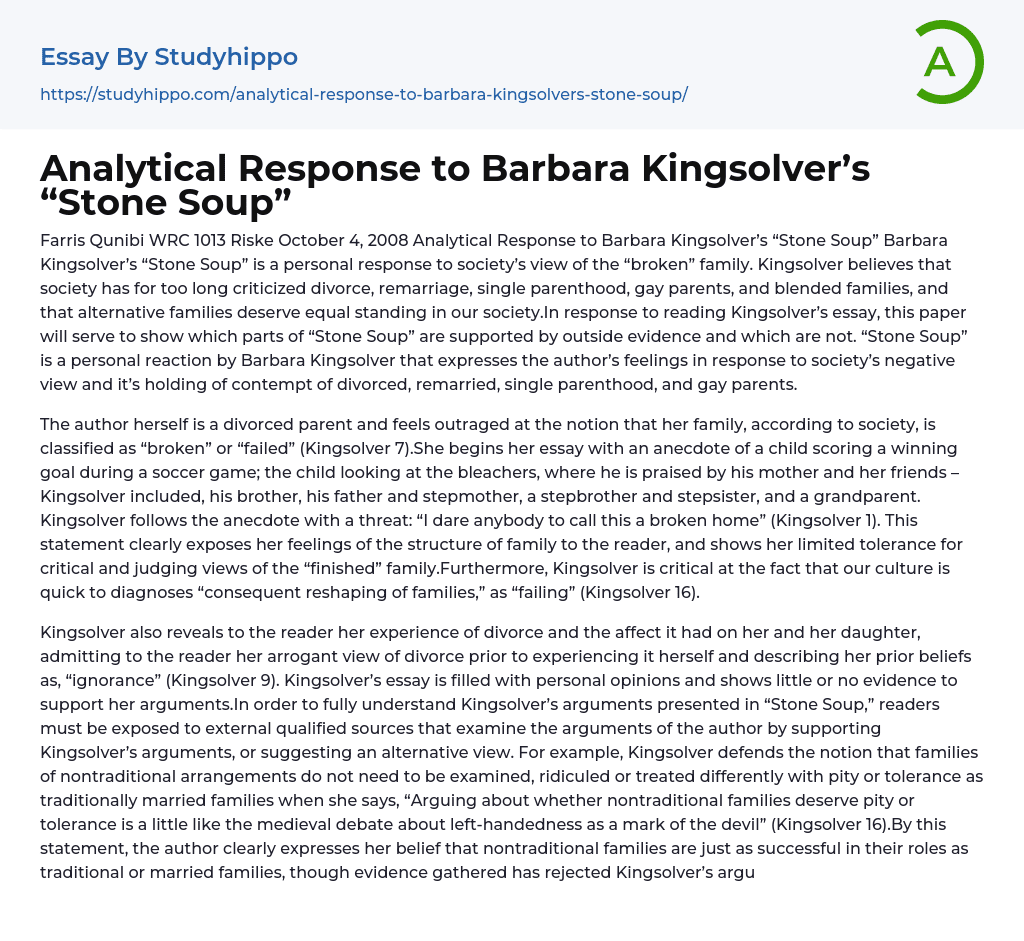

Analytical Response to Barbara Kingsolver’s “Stone Soup” Essay Example
“Stone Soup” Barbara Kingsolver’s “Stone Soup” is a personal response to society’s view of the “broken” family. Kingsolver believes that society has for too long criticized divorce, remarriage, single parenthood, gay parents, and blended families, and that alternative families deserve equal standing in our society.In response to reading Kingsolver’s essay, this paper will serve to show which parts of “Stone Soup” are supported by outside evidence and which are not. “Stone Soup” is a personal reaction by Barbara Kingsolver that expresses the author’s feelings in response to society’s negative view and it’s holding of contempt of divorced, remarried, single parenthood, and gay parents.
The author herself is a divorced parent and feels outraged at the notion that her family, according to society, is classified as “broken” or “failed” (Kingsolver 7).She begins her es
...say with an anecdote of a child scoring a winning goal during a soccer game; the child looking at the bleachers, where he is praised by his mother and her friends – Kingsolver included, his brother, his father and stepmother, a stepbrother and stepsister, and a grandparent.
Kingsolver follows the anecdote with a threat: “I dare anybody to call this a broken home” (Kingsolver 1). This statement clearly exposes her feelings of the structure of family to the reader, and shows her limited tolerance for critical and judging views of the “finished” family.Furthermore, Kingsolver is critical at the fact that our culture is quick to diagnoses “consequent reshaping of families,” as “failing” (Kingsolver 16).
Kingsolver also reveals to the reader her experience of divorce and the affect it had on her and her daughter, admitting to the reader her arrogant view of divorce prior to experiencing
it herself and describing her prior beliefs as, “ignorance” (Kingsolver 9). Kingsolver’s essay is filled with personal opinions and shows little or no evidence to support her arguments.In order to fully understand Kingsolver’s arguments presented in “Stone Soup,” readers must be exposed to external qualified sources that examine the arguments of the author by supporting Kingsolver’s arguments, or suggesting an alternative view.
For example, Kingsolver defends the notion that families of nontraditional arrangements do not need to be examined, ridiculed or treated differently with pity or tolerance as traditionally married families when she says, “Arguing about whether nontraditional families deserve pity or tolerance is a little like the medieval debate about left-handedness as a mark of the devil” (Kingsolver 16).By this statement, the author clearly expresses her belief that nontraditional families are just as successful in their roles as traditional or married families, though evidence gathered has rejected Kingsolver’s argument.
In an article by Naomi Gerstel and Natalia Sarkisian, the authors present the benefits of marriage as opposed to divorced or single parenthood families. Naomi Gerstel writes that, “advocates [of marriage] such as David Popenoe and Linda Waite assert that marriage is good for one’s pocketbook, health, happiness, sex life, and kids.Both men and women who are married tend to have higher incomes, more wealth, better health, and more property than those who are not. ” The article goes on to describe the negative impacts of divorce and nontraditional families by introducing National Census statistics of relationships between married parents and their children compared with relationships between divorced or separated parents and children of that divorce.
Also, in an article titled “Children of Divorce: Stories of Loss and
Growth” by John H. Harvey and Mark A. Fine, the article reads, “compared with children from first-married families, children of divorced parents have been found to have lower income and educational attainment, to marry at younger ages, and to be more likely to cohabit prior to mar¬riage (Furstenberg & Teitler, 1994). These examples, along with others that will be presented later in this essay are strong refusals of Kingsolver’s argument that families of divorce should be given the same respect and treatment of married families.
- Belief essays
- Deontology essays
- Ethical dilemma essays
- Moral essays
- Normative Ethics essays
- Values of Life essays
- Virtue essays
- Virtue Ethics essays
- Work Ethic essays
- Adoption essays
- Aunt essays
- Babies essays
- Bedroom essays
- Caring essays
- Children essays
- Daughter essays
- Divorce essays
- Dog essays
- Dysfunctional Family essays
- Family Tradition essays
- Family Values essays
- Father essays
- Foster Care essays
- Friends essays
- Grandparent essays
- Home essays
- Hometown essays
- Husband essays
- Jealousy essays
- Love essays
- Marriage essays
- Mother essays
- Online Dating essays
- Parenting essays
- Parenting Teens essays
- Parents essays
- Relationship essays
- Room essays
- Sibling essays
- Sister essays
- Wedding essays
- Wife essays
- Caste System essays
- Citizenship essays
- Civil Society essays
- Community essays
- Culture essays
- Deviance essays
- Discourse Community essays
- Female essays



